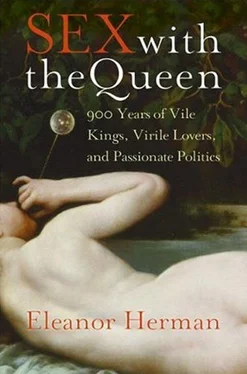Less likely a target of assassination, the queen, if sleeping without her husband, required waiting women in her room to provide an alibi for her virtue. A lady-in-waiting would sleep on the floor next to the royal bed or, if the queen wished another human body to warm the frosty sheets, in bed with the queen herself. Whether the queen went walking or stayed in her room reading by a crackling fire, a bevy of ladies always danced attendance.
A sure sign of a love affair was when the queen became partial to just one female servant at the expense of the others. Only this particular lady slept in the queen’s room at night, only she walked with her in the gardens, dressed her and bathed her and embroidered with her before the fire. If the queen reduced her retinue to just one for her private time, it usually meant that this servant was her accomplice in a love affair. Indeed, without a lady-in-waiting accomplice, a queen or princess would have found it impossible to have a lover. And if her virtue was challenged, her servant would swear that she had been with the queen the entire time in question, reading the Bible.
When Henry VIII’s fifth wife, the silly teenaged Catherine Howard, had a sizzling love affair with the handsome courtier Thomas Culpeper in 1542, the assistance of her lady-in-waiting Lady Jane Rochford was invaluable. The court was frequently changing lodgings, and when the queen arrived at a palace, Lady Rochford would first spy out which apartments were connected to back doors and secret staircases. These were the apartments she would choose for the queen. Lady Rochford took messages back and forth between the lovers and sneaked Culpeper in and out of Catherine’s apartments.
In the 1690s Hereditary Princess Sophia Dorothea of Hanover relied entirely on her devoted lady-in-waiting, Eleonore de Knesebeck, to facilitate her love affair with the Swedish count Philip von Königsmark. Knesebeck wrote many of Sophia Dorothea’s love letters to the count in her own hand and received the count’s letters addressed to her. That way, if they were intercepted, it would look as if the count and Eleonore had been having the affair. When Königsmark was bold enough to venture into Sophia Dorothea’s rooms in the palace, Eleonore de Knesebeck waited by a little door leading from the palace to the garden and opened it when she heard him whistling a tune called “The Spanish Follies.” She then led him up a hidden staircase directly to the princess’s bedchamber.
It was easier for a royal woman to have lovers when she was not under the intense scrutiny of thousands of eyes at the palace. Napoleon’s sister Pauline, Princess Borghese, evaded her brother’s prudish gaze by claiming ill health and rumbling about the health spas of Europe looking for a cure. Though she never found a cure, she did find vigorous sex from numerous lovers.
In 1807 at the health spa of Plombières, Pauline fell head over heels in love with the aristocratic comte Auguste de Forbin. The intensity of her passion seemed to consume her very flesh; she fell ill from the violence of it and could not eat or sleep. A gynecologist was sent for who made the following report: “Her habitual and constant state is one of uterine excitement and if this state is continued and prolonged it can become alarming.” 4To calm down her uterus, Pauline was forced to give up her lover, at least officially.
Clucking loudly about her need for improved health, she sent away most of her servants and rumbled over rutted roads nearly five hundred miles to the tiny spa town of Gréoulx, where the comte de Forbin had a castle. For months they lived quietly, spending most of each day in bed. But Napoleon’s eagle eye turned for a moment from the field of war and searched out his rebellious sister. He forced the poor count to join the French army.
A century later Crown Princess Marie of Romania visited her mother at various locales throughout Germany, including health spas, her lovers secretly following her. Here were no spies paid by grouchy King Carol to report her every move, as there were at her palace in Bucharest. Twice Marie became pregnant during long visits to her mother, with her husband hundreds of miles away in Romania. The first pregnancy likely ended in a miscarriage, and the second pregnancy resulted in her third child, Princess Marie.
Taking the waters was a much-used strategy not only for lovers’ trysts, but also when the result of a tryst was due to arrive nine months later. A woman in her third trimester of pregnancy would announce she was unwell—suffering from dropsy, perhaps, an illness which resulted in swelling—and needed to drink the restorative waters of a particular spa. She would choose one conveniently far from home, where she would be less likely to run into acquaintances. The journey there, in easy stages, might take a month. Once at the spa—where she would go incognito— she would have the child and arrange to give it away. If she was fortunate, her lover’s relatives would agree to take the child and raise it as their own. After the birth, she would socialize more, take the waters, and return home slender and radiating good health. The magical waters had worked.
In 1811 Hortense de Beauharnais, daughter of Empress Josephine, found herself pregnant by her lover, a handsome soldier named Charles de Flahaut. Hortense had not lived with her husband, Louis Bonaparte, Napoleon’s brother, for years. Though Napoleon had made them king and queen of the Netherlands in 1806, Hortense reaped little benefit from her exalted status. King Louis forced his wife to remain in her rooms—which smelled of sewage and overlooked a graveyard— while he enjoyed palace entertainments.
Exposure of her pregnancy would have meant a public divorce, a shattered reputation, and the loss of her children with Louis. Luckily, the fashions of the times hid her expanding belly. In a high-waisted gown, with a large shawl draped around her, she hosted a party to celebrate Napoleon’s birthday two weeks before her child was born, and no one guessed her condition. Right before the birth, Hortense visited a health spa with Charles where she had the child. Her son was whisked away to Charles’s accommodating mother, so at least Hortense obtained news of him as he grew up.
Visiting a health spa was an alibi so frequently used by women with inconvenient pregnancies that the invalid visitor who really did hope for improved health was often credited upon her return home with having given birth to a bastard. Sometimes even a long illness inside the palace itself gave rise to rumors of pregnancy. When George III’s daughter Princess Amelia died in 1810 of tuberculosis, it was said she had given up the ghost bearing twins.
Elizabeth I’s 1562 smallpox attack—which almost killed her— led to stories that she had been not ill, but had given birth to a love child with her virile suitor Robert Dudley. Foreign courts, hearing stories of Elizabeth’s daughter, were eager to arrange a marriage with her; even though illegitimate, the child would likely be named heir to the English throne. In 1575 the bishop of Padua heard that the queen had “a daughter, thirteen years of age, and that she would bestow her in marriage to someone acceptable to His Catholic Majesty (Philip II of Spain).” 5When the Spanish ambassador politely brought up the subject of betrothing Elizabeth and Dudley’s illegitimate daughter to a Hapsburg prince, however, his request was met with howls of laughter.
In 1802 Princess Sophia, the unmarried daughter of King George III of Britain, gained a great deal of weight and claimed she was terribly ill. At the royal residence of Weymouth one night, she gave birth to a boy. The following morning her doctor brought a baby boy to the wife of the village tailor who had also delivered a son in the night. The tailor proudly announced that his wife had actually delivered twins. Oddly, the twins looked nothing alike, and one of them was wrapped in a gorgeous palace blanket embroidered with a coronet. Word got out in the village about the tailor’s royal twin, and dozens of curious people from all walks of life stopped by with alterations, offhandedly asking to see the boy and his regal blanket. When the crowds grew too large, the boy’s supposed father, General Thomas Garth, took him away from the tailor and raised him as his own.
Читать дальше












